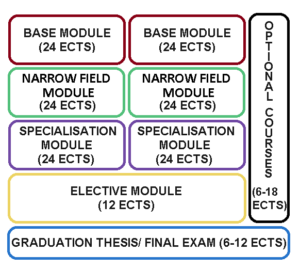- Career Hub
- Future Skills
- Academic planning
- Planning further studies
- Planning your studies
- How to manage your studies?
- How to plan for your studies?
- How much freedom do you have to modify your studies?
- When to make learning choices within the curriculum?
- How little or how much can you study?
- How can you concentrate on and manage the time of studies?
- How to change specialisations?
- How to study well?
- Internship
- International experience
- Work-life development
- Act and grow
How much freedom do you have to modify your studies?

There are different types of curricula at the University of Tartu. Curricula are generally more flexible in bachelor’s studies than in professional higher education and integrated studies.
| A moment of reflection: How familiar are you with your curriculum – which courses or modules are compulsory? What, when and how can you study as elective and optional courses? Can you and do you want to select a minor specialisation? If and where do you want to go for a mobility, as a visiting student or a traineeship? |
These questions require careful thought and good planning to fit into your period of study both the compulsory part of the curriculum and all the other interesting and useful things you want to gain from university. Start planning by keeping the compulsory volume in mind. To do this, read the general principles of curriculum structure and take a closer look at the modules and courses of your curriculum.
In bachelor’s studies, you can largely design the compulsory part yourself, as each curriculum is made up of modules that you can put together like a jigsaw puzzle, based on your interests and desires.

- Keep a close eye on which modules are compulsory and which are optional in your curriculum.
- Think about which narrow field and specialisation modules in your curriculum are of more interest to you.
- If the module contains more courses than the module requires (24 or 12 ECTS), you can choose the courses you prefer.
- Modules can also be chosen from other curricula either as a single narrow field or specialisation module or as a minor specialisation (a minor specialisation consists of one narrow field module, one specialisation module and one elective module). You can also choose a minor specialisation from a bachelor’s curriculum of another university.
- You can select courses of interest that are not included in your chosen modules as elective or optional courses from your own curriculum or as optional courses from other curricula.
You can also take advantage of other exciting and useful opportunities during your studies.
If you are thinking of going abroad for studies, traineeship or summer school, check the opportunities on offer well in advance. When planning, think about when and how to study abroad, and how to plan your studies domestically if you will be away from your home university for a shorter or longer period.
Students at the University of Tartu can register as visiting students and attend lectures and seminars at other universities in Estonia. If the student so wishes, courses completed as a visiting student will be taken into account in the completion of their curriculum at the University of Tartu, if they fit into the curriculum, and may also be taken into account as optional courses.
At the University of Tartu, all curricula have a practical training course, either in a smaller or larger volume, and as one or more compulsory or optional courses. Traineeships can be done in Estonia or abroad.
Traineeships are a great way to gain work experience, apply your professional knowledge and skills and get a broader view of job opportunities. During the traineeship, you can analyse yourself, refine your job aspirations and development needs, and gain experience, ideas and contacts to plan your career. ECTS are also awarded for traineeships.
